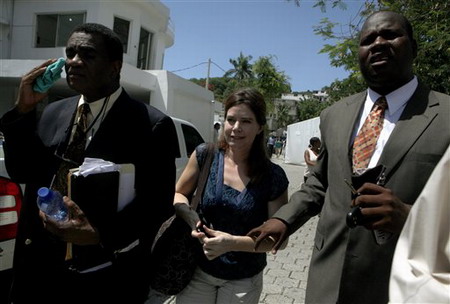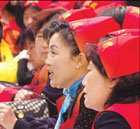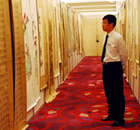Asia-Pacific
US missionary convicted in Haiti, but free to go
(Agencies)
Updated: 2010-05-18 10:12
 |
Large Medium Small |
|
 US missionary Laura Silsby (C) leaves a courthouse in Port-au-Prince, Monday, May 17, 2010. [Agencies] |
PORT-AU-PRINCE, Haiti - The last of 10 Americans detained while trying to take 33 children out of Haiti after the January 12 earthquake was freed Monday when a judge convicted her but sentenced her to time already served in jail.
Laura Silsby, the organizer of the ill-fated effort to take the children to an orphanage being set up in the neighboring Dominican Republic, returned to her cell briefly to retrieve belongings before quickly heading to the Port-au-Prince airport.
"I'm praising God," Silsby told The Associated Press as she waited for a flight out of Haiti. She declined to answer further questions before clearing immigration and heading through a gate to catch a plane to Florida.
Prosecutor Jean-Serge Joseph said she was convicted and sentenced to the 3 months and 8 days she spent behind bars. Last week, the prosecution had recommended a six-month sentence and she faced a maximum of three years on the charge.
"She is free," Joseph said.
The 40-year-old Silsby told the court earlier she thought the children were orphans whose homes were destroyed in the earthquake. But she lacked the proper papers to remove them from the country at a time when the government was restricting adoptions to prevent child trafficking in the chaos that followed the disaster.
An AP investigation later revealed all the children had at least one living parent, who had turned their children over to the group in hopes of securing better lives for them.
Silsby and others in the group, mostly members of the same Baptist church in Idaho, insisted they had only come to Haiti to help. They unwittingly helped draw attention to the dark side of the adoption industry in Haiti, where children for many years have been abandoned by their parents or sold into slavery.
In February, a Haitian judge released eight of the Americans after concluding they had not knowingly engaged in any crime. The judge released a ninth member, Silsby's friend and former nanny, Charisa Coulter, in March.
Silsby was held the longest because she organized the venture and prosecutors insisted she knew that she did not have the proper authorization to take the children out of Haiti.
She was prosecuted with Jean Sainvil, an Atlanta-based pastor born in Haiti who allegedly helped find the children for the missionaries. The pastor, facing the same charge as Silsby, was not in Haiti and was being tried in absentia. The status of his case was not immediately clear.











